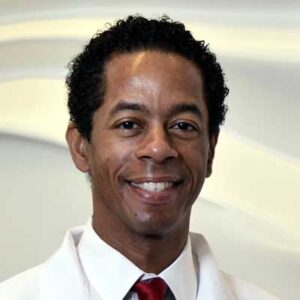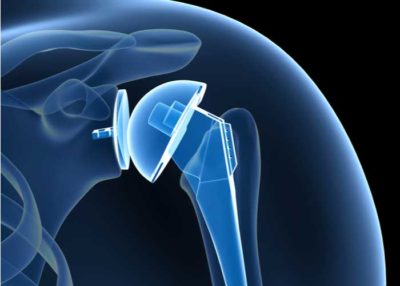Total Shoulder Replacement Surgeon

Have you been diagnosed with shoulder arthritis? Have conservative measures failed to alleviate your shoulder pain caused by arthritis? If so, you may be a candidate for a total shoulder replacement. Total shoulder replacement surgery is an excellent option for patients suffering from arthritis who have exhausted all non-surgical options. Shoulder replacement surgeon, Doctor Riley J. Williams provides diagnosis as well as surgical and nonsurgical treatment options for patients in Manhattan, Brooklyn, New York City and surrounding areas who have developed shoulder arthritis. Contact Dr. Williams’ team today!
What is total shoulder replacement (Arthroplasty)?
Total shoulder replacement (TSR) is also known as total shoulder arthroplasty. TSR involves replacing the arthritic and damaged surfaces of the shoulder joint using prosthetic implants. The shoulder is a ball and socket joint and is comprised of three bones: the humerus, scapula and clavicle. The humerus is the upper arm bone, and the scapula is the shoulder blade. The superior portion of the humerus (humeral head) along with the glenoid socket of the scapula make up the glenohumeral joint. Total shoulder

replacement is performed on the primary shoulder joint or glenohumeral joint. Articular cartilage lines the end of all long bones and provides the cushion within the shoulder joint, thus allowing the shoulder to move easily and comfortably. Cartilage loss or erosion can occur in association with wear and tear or trauma. Cartilage loss leads to symptomatic arthritis. Cartilage loss results in bone-on-bone contact within the joint, and can cause significant pain and dysfunction. Resurfacing of the humeral head and glenoid socket using the appropriate prostheses as part of the TSR procedure can provide affected patient with durable pain relief and increased function. Doctor Riley J. Williams, Orthopedic Shoulder Surgeon in Manhattan and the New York area, is an expert in performing total shoulder replacement and total shoulder arthroplasty.
Why is total shoulder replacement/arthroplasty performed?
Total shoulder replacement is performed to provide patients with pain relief and increased function. Articular cartilage allows joint surfaces to move fluidly against one another; cartilage is a durable tissue that as a shock absorber. Articular cartilage damage progresses to cartilage loss and exposure of the underlying bone. Joints that are characterized by bone on bone contact are often painful and poorly functioning. Total shoulder replacement enables affected individuals to regain shoulder range of motion of the shoulder and perform normal activities and sports without pain. Degenerative conditions of the shoulder occur following trauma, a fracture, a torn rotator cuff, in association with rheumatoid arthritis (autoimmune) or in association with osteoarthritis (wear and tear). These conditions can lead to significant cartilage loss, joint pain, joint swelling, decreased range of motion and pain.
What is shoulder arthritis surgery?
When conservative treatment methods (rest, corticosteroid injection, physical therapy, NSAIDs, and activity modification) fail to alleviate pain in the arthritic shoulder, TSR may be recommended. There are a few different types of shoulder arthritis surgery that Dr. Williams may suggest depending on the type of injury and age of the patient. These may include:
- Shoulder debridement & synovectomy: Removal of loose bodies and inflamed tissue.
- Total shoulder replacement
Dr. Riley J. Williams, orthopedic shoulder surgeon, serving Manhattan, Brooklyn, New York City, NY and surrounding areas, has extensive experience performing total shoulder replacement and shoulder arthritis surgery.
How is total shoulder arthroplasty performed?
The goal of a total shoulder replacement is to replace the worn and damaged portions of the shoulder with a prosthesis, thus eliminating the pain of osteoarthritis. The humeral head or ball of the shoulder is replaced with a thin metal cover, which is attached to a small stem. This stem is inserted in the proximal humerus bone as a press fit. A high-density plastic prosthesis is used to resurface the socket. Total shoulder replacement is done as an outpatient, and patients can expect to go home the same day. Some patient may wish to stay overnight one night after TSR; Dr. Williams will advise you as to which pathway is best for you based on your medical condition. The surgery is performed with a combination of general and regional anesthesia. Regional anesthesia or nerve blocks help patients with postoperative pain relief. Most patients will not experience pain for several hours after the surgery. Total shoulder replacement surgery takes approximately one hour. Intravenous antibiotics are used before the operation to help limit the chances of infection. Following surgery, patients are advised to use a sling for two weeks.
What are the risks of total shoulder replacement?
Individuals in the New York area who have had total shoulder arthroplasty typically have a very successful outcome. Complication are very rare. TSR surgery has certain risks that may include:
- Infection, although uncommon due to intravenous antibiotics, is possible
- Nerve damage
- Shoulder stiffness
How long is the recovery after a total shoulder replacement?
Once the patient leaves the hospital, his or her arm will be in a sling for two weeks. Absorbable sutures are used, thus removal is not necessary. Dr. Williams will evaluate you two weeks after surgery, subsequent to which, physical therapy will commence. Physical therapy will continue for 2-3 months, twice week. There are daily home exercises that are prescribed to ensure a good outcome. An individual will need to avoid driving for approximately two weeks. A return to normal activities of daily living should be expected by six weeks. Full unfettered recovery takes 4-6 months depending on how quickly the patient is able to restore normal shoulder girdle strength.
For additional resources on total shoulder replacement, shoulder arthritis surgery or to have your shoulder pain evaluated, please contact the office of Dr. Riley J. Williams, MD, orthopedic shoulder surgeon serving Manhattan, Brooklyn, New York City, NY and surrounding areas.